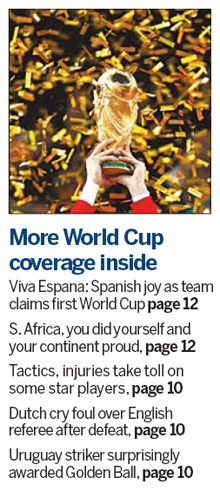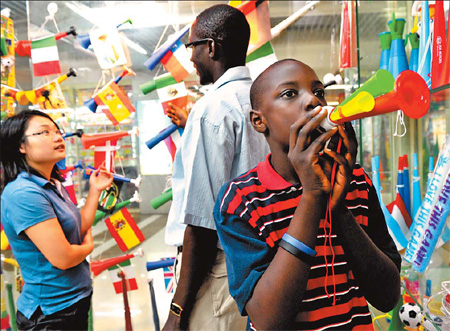
Chief executive Miao Liansheng did not need an octopus to predict his company would do well out of the sponsorship deal.
Although the company is yet to report a sales boom, its stock listed on the New York exchange has risen almost 38 percent since June 7, pushing its market value past $474 million. Its shipment volume is also expected to double this year compared to 2009, said spokesman Miao Qing.
The deal agreed between Yingli and FIFA (world soccer's governing body) means the brand will also have pride of place at the next World Cup finals in Brazil in 2014.
Harbin Beer, a popular Chinese brand owned by Anheuser-Busch InBev that was made available at venues across South Africa, also increased production levels by 5 to 10 percent to meet demand.
Manufacturing firms in China were perhaps the biggest winners, though.
Domestic firms made about 90 percent of vuvuzelas (colorful horns) on sale at the World Cup, a market worth roughly $20 million, while Zhejiang Dafeng Sports Equipment Co Ltd made the 50,000 seats fitted at the Nelson Mandela Bay Stadium in Port Elizabeth.
China also exported more than 100 million condoms to South Africa ahead of the World Cup, according to Tan Xiaolun, deputy director of the China Rubber Industry Association's emulsion branch.
"Experience shows that large sporting events always have a positive effect on condom sales," he told Mirror Evening News.
He explained that the majority was produced by rubber factories in Guilin in the Guangxi Zhuang autonomous region and Guangzhou, capital of Guangdong province.
China was chosen to make the condoms because it has a low labor cost and a large production capacity, added Tan. "There is not much profit because condom production consumes a lot of resources and energy but the export price is not high."
Lawrence Chen, a senior strategist for international consultants Interbrand, said Chinese enterprises are increasingly taking advantage of major world sporting events to promote their brands and gain global popularity.
China Central Television (CCTV), the State broadcaster that won the exclusive rights to show live coverage of the FIFA World Cup, had been offering advertising spots for the one-month event since November.
|

A boy tries a vuvuzela at a trade center in Yiwu, Zhejiang province. Toy factories there have enjoyed boom times thanks to the FIFA World Cup in South Africa. Zhang Jiancheng / for China Daily
|
Companies like China Mobile, Deerway and Tsingtao Beer spent billions of yuan vying for commercial space alongside Adidas, Coca Cola and Sony, while the Langjiu Group, a Sichuan-based alcohol manufacturer, paid 33 million yuan to sponsor the channel's top scorer chart.

